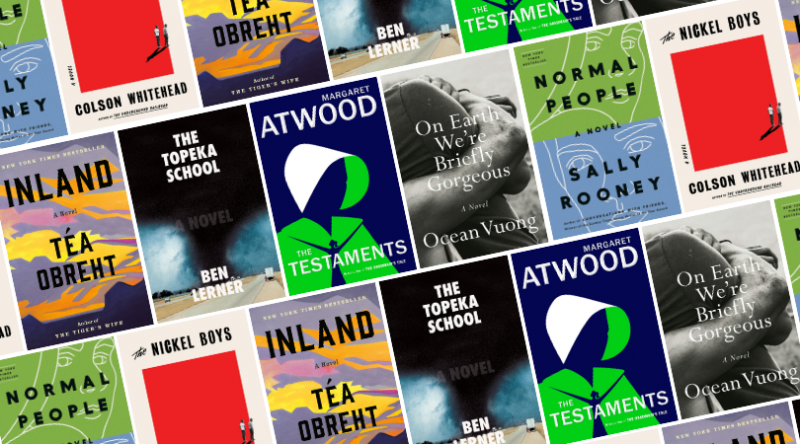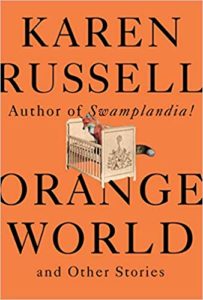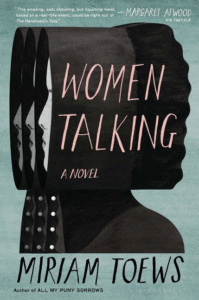
We’ve come to the end of another year in reading, folks, and as stewards of this venerable repository of literary criticism, it is once again our sacred duty to dust off the abacuses (abaci?) and tabulate the best reviewed books of past twelve months.
Yes, using reviews drawn from more than 150 publications, over the last two weeks we’ve been revealing the most critically-acclaimed books of 2019, in the categories of (deep breath): Memoir & Biography, Poetry, Sci-Fi & Fantasy, Essay Collections, Graphic Literature, Literature in Translation, Short Story Collections, Mystery & Crime, and Nonfiction.
Now, for our final roundup of the year, we turn to Fiction.
1. Normal People by Sally Rooney
34 Rave • 22 Positive • 5 Mixed
“… a compulsive, psychologically astute will-they-or-won’t-they love story involving two of the most sympathetic people you’re liable to meet between covers. Although hailed as a voice of millennials, Rooney offers plenty to appeal to readers across genders and generations … Rooney’s dialogue, like her descriptive prose, is slyly ironic, alternately evasive and direct, but always articulate. It cuts to the heart. She seems remarkably comfortable writing about sex—even uncomfortable sex—and she seamlessly integrates well-crafted texts, emails, and Facebook posts into her narratives like the digital native she is. Yet while Rooney may write about apparent aimlessness and all the distractions of our age, her novels are laser-focused and word-perfect. They build power by a steady accretion of often simple declarative sentences that track minuscule shifts in feelings … Although frequently heartbreaking, Normal People isn’t bleak. The brave determination of Rooney’s characters to reach out and try to catch each other with no guarantee of success — and to open themselves to ‘moments of joy despite everything’—is ultimately hopeful.”
–Heller McAlpin (NPR)
2. The Nickel Boys by Colson Whitehead
41 Rave • 10 Positive • 1 Mixed • 1 Pan
“… no mere sequel. Despite its focus on a subsequent chapter of black experience, it’s a surprisingly different kind of novel. The linguistic antics that have long dazzled Whitehead’s readers have been set aside here for a style that feels restrained and transparent. And the plot of The Nickel Boys tolerates no fissures in the fabric of ordinary reality; no surreal intrusions complicate the grim progress of this story. That groundedness in the soil of natural life is, perhaps, an implicit admission that the treatment of African Americans has been so bizarre and grotesque that fantastical enhancements are unnecessary … Whitehead reveals the clandestine atrocities of Nickel Academy with just enough restraint to keep us in a state of wincing dread. He’s superb at creating synecdoches of pain … feels like a smaller novel than The Underground Railroad, but it’s ultimately a tougher one, even a meaner one. It’s in conversation with works by James Baldwin, Ralph Ellison and especially Martin Luther King … what a deeply troubling novel this is. It shreds our easy confidence in the triumph of goodness and leaves in its place a hard and bitter truth about the ongoing American experiment.”
–Ron Charles (The Washington Post)
3. Inland by Téa Obreht
27 Rave • 11 Positive • 3 Mixed • 1 Pan
“Magic realism served Obreht well in her fable about Yugoslavia’s baroque divisions, and it’s no less effective in shaping this alternative foundation myth about the American west. On the face of it the book begins conventionally enough … The twist lies in Obreht’s affinity for unusual transformations … Exquisitely panoramic as it is, Lurie’s account of his travels forms only one strand of the novel. It’s interwoven with the tale of a single day in the life of Nora, a frontierswoman … Obreht builds a narrative that is every bit as compelling as Lurie’s and just as full of revelations. Their parallel journeys into Arizona’s inhospitable interior…probe the cost of survival and the human yearning to belong. On every page gorgeously tinted images conjure the otherworldliness of this desert existence … It’s the west, but not as we know it. Nora and Lurie are set on a collision course: will they meet? Obreht’s narrative skill here is part of the magic of Inland, which succeeds spectacularly at reinventing a well-worn genre and its tropes. There are no stereotypes in this western, only ferociously adroit writing that honors the true strangeness of reality in its search for the meaning of home.”
–Elizabeth Lowry (The Guardian)
4. The Topeka School by Ben Lerner
21 Rave • 16 Positive • 10 Mixed
“…thoroughly, intimidatingly brilliant and absolutely contemporary … funny, and at times, painfully acute. A bildungsroman in lyric chorus, it looks back on the past with affection but without nostalgia, and lands in the frighteningly unsure coda of the present day … manages, in its particularity, to tell a story that is emblematic of American life … Lerner seems to reinvent the novel as a happy side effect of some other project … He is a supremely gifted prose stylist, at once theoretical and conversational; he never bores or blathers, and is always limpid. Rather than inviting the reader to look at him or his life, he invites the reader to look through him … It is a testament to Lerner’s immense skill as a storyteller that his novels that double as essays and flicker like poems are also as frictionless as any classic work of nineteenth-century realism, easily reeling the reader in to their worlds, which display, in modernist style, all the seams … Lerner is a genius of self-consciousness in all its senses—the thinking mind, the ambivalent attachment, the awkward social performance.”
–Christine Smallwood (Harper’s)
5. The Testaments by Margaret Atwood
19 Rave • 20 Positive • 13 Mixed • 1 Pan
“Atwood picks up plot elements that originated in the TV series…and twists them to her own ends … The Testaments owes more to the TV series than a handful of details. Its tone hews closer to the series than to the novel that precedes it … The Testaments is fun to read in a way that The Handmaid’s Tale is not, fun in the same way that the TV series, for all its grim lighting and performances, is crowd-pleasing. Its characters are not powerless or crushed … The Testaments comes adorned with much splendid writing. Atwood, who is also a poet, can turn a metaphor that feels both original and like something you’ve always known … All of this and a corker of a plot, culminating in a breathless flight to freedom, makes The Testaments a rare treat.”
–Laura Miller (Slate)
6. On Earth We’re Briefly Gorgeous by Ocean Vuong
22 Rave • 14 Positive • 5 Mixed
“Vuong uses language to conjure wholeness from a situation that language has already broken, and will continue to break; loss and survival are always twinned … The structural hallmarks of Vuong’s poetry—his skill with elision, juxtaposition, and sequencing—shape the novel … Success as a writer is the mostly unspoken end point of Little Dog’s story: readers who know Vuong’s biography will assume it, and those who don’t will infer it from the strength of the book’s language … Reading On Earth We’re Briefly Gorgeous can feel like watching an act of endurance art, or a slow, strange piece of magic in which bones become sonatas, to borrow one of Vuong’s metaphors … Like the Beijing-born novelist Yiyun Li, Vuong has a fondness for the sort of wordplay that involves noticing odd accidents in the language that he had to consciously learn … Lines like these risk preciousness, but Vuong’s earnestness is overpowering … In the context of those conferences, Vuong’s story seems extraordinary. But, while Vuong himself is exceptional, much of his experience is not unusual.”
–Jia Tolentino (The New Yorker)
7. Black Leopard Red Wolf by Marlon James
21 Rave • 18 Positive • 3 Mixed • 1 Pan
“In these pages, James conjures the literary equivalent of a Marvel Comics universe—filled with dizzying, magpie references to old movies and recent TV, ancient myths and classic comic books, and fused into something new and startling by his gifts for language and sheer inventiveness … James is such a nimble and fluent writer … Even when he is nestling one tale within another like Russian dolls that underscore the provisional nature of storytelling… he is giving us a gripping, action-packed narrative. What the novel could have used is a little judicious pruning: As in superhero movies, the action sometimes assumes a predictable, episodic rhythm—one violent, bravura showdown after another, strung together by interludes of travel and efforts to regroup and connect the dots … With Tracker and the Leopard, James has created two compelling and iconic characters—characters who will take their place in the pantheon of memorable and fantastical superheroes.”
–Michiko Kakutani (The New York Times Book Review)

8. Orange World by Karen Russell
25 Rave • 4 Positive • 1 Mixed
“Something is, however, not right in each of these worlds. Usually two things—one private, the other bigger, in one way or another environmental. Russell’s gift is how she braids these together, letting the private un-right-ness bob to the surface like a beacon … With each story Russell pitches a pup tent in each new universe so rapidly you almost don’t feel its assumptions getting to their dark work … These tales are not short, but they feel even roomier owing to the way Russell cracks open narrative space with humor … Russell is also the greatest user of verbs in American fiction since Annie Dillard. Dogs ‘dervish’ around kitchens. A man is ‘turtled’ into his hoody in a rain storm … The precision of Russell’s writing makes it that much easier to accept how she is tilting reality.”
–John Freeman (The Boston Globe)
9. Exhalation by Ted Chiang
22 Rave • 8 Positive
“A handful of living science fiction writers have attained godlike status—N.K. Jemisin, Cixin Liu, and Ann Leckie, to name a few. But Ted Chiang is the only one who’s done it without writing a novel … oh, his stories. They’re a religious experience … In Exhalation, which could be subtitled ‘Black Mirror For Optimists,’ every story seems crafted with one objective in mind—pure awe … The three longer stories in Exhalation are Chiang’s finest work to date … Savor all nine of these stories. Read them one sitting at a time, somewhere still and quiet, and let them sink in.”
–Adam Morgan (The A.V. Club)

10. Women Talking by Miriam Toews
18 Rave • 12 Positive
“… less an indignant manifesto about sexual trauma, or a speculative celebration of female empowerment, than it is a confession of violence as something stitched into the fabric of every community, and an exploration of what it means to claim communal thought—even disagreement itself—as an inalienable human right … crackles with the energy of consciousness on every page. Its attention is tender and funny, its characters utterly distinct and alive … The novel is deeply aware of how this simultaneity—the weighty sitting shoulder to shoulder with the daily—is especially inescapable for women … Toews doesn’t just allow the trivial to live alongside the weighty, she insists on it…By refusing to segregate the mundane from the consequential, Toews implicitly argues that what we call trivial often isn’t trivial at all—that just as much truth lives inside those small moments of care and grace as in our grand philosophizing about authority and justice—and allows her characters to come to life as more than helpless victims or walking thesis statements … resists false binaries at every turn. Profundity and banality are entangled … This novel knows that truth: Violence is something more systemic than a few rapists; more like a wildfire than a small burn contained to a few toxic bodies you can lock away for good … holds the persistence of their grace while refusing to make false promises about the redemption or vindication waiting for them beyond its final page.”
–Leslie Jamison (Bookforum)
*
Our System: RAVE = 5 points • POSITIVE = 3 points • MIXED = 1 point • PAN = -5 points
If you buy books linked on our site, Lit Hub may earn a commission from Bookshop.org, whose fees support independent bookstores.

